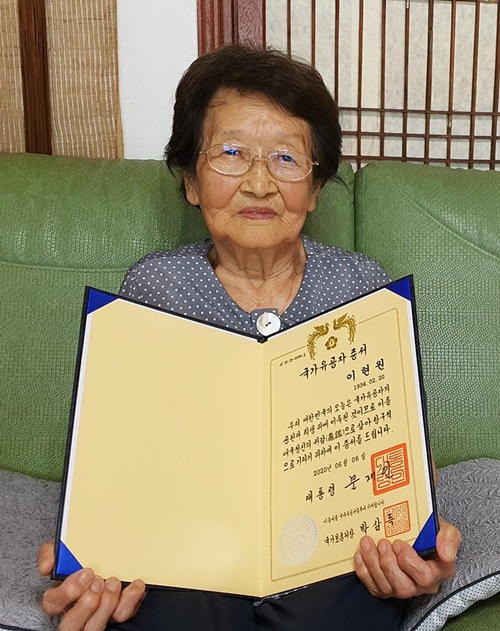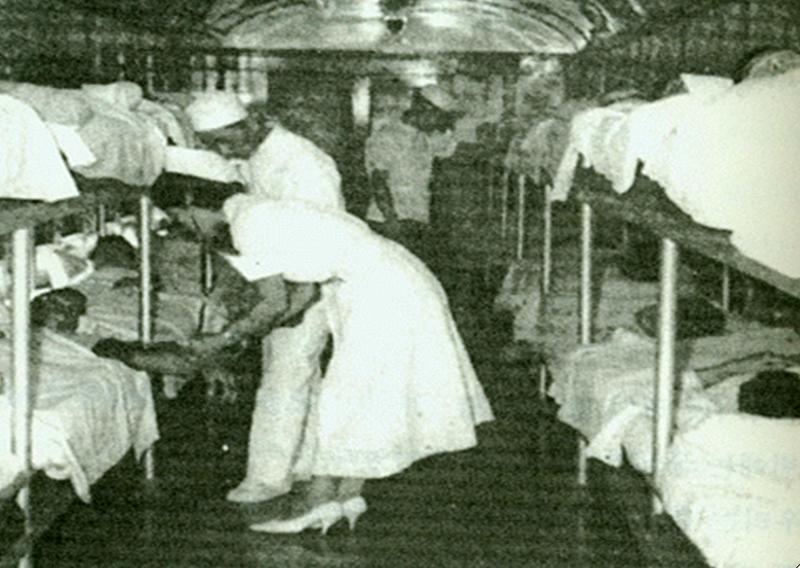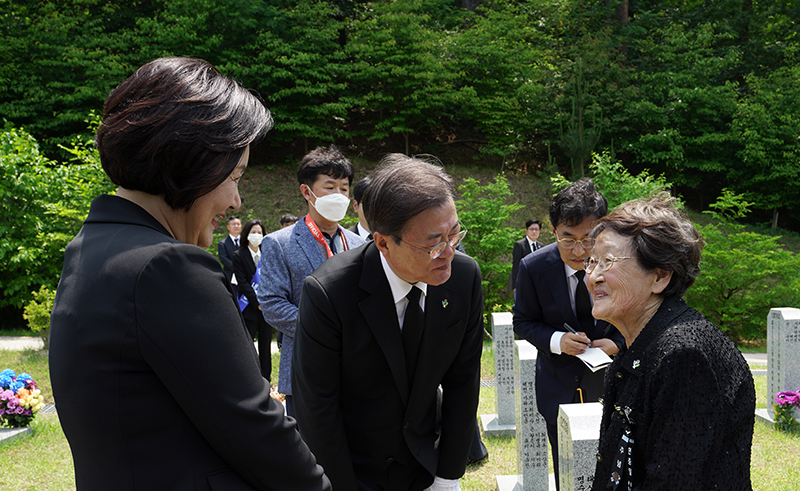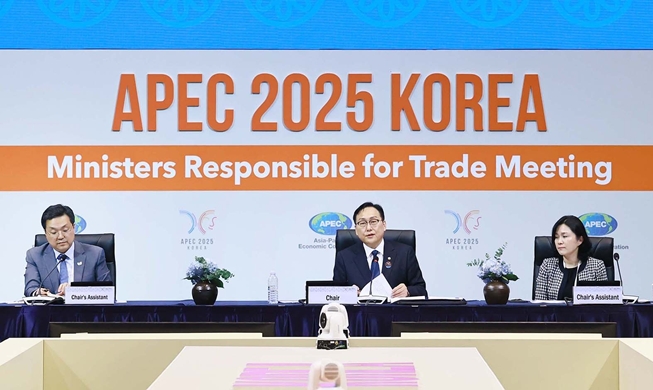
Lee Hyun-won was appointed a nurse officer in 1953 and took part in the Korean War as a reserve lieutenant after being a member of the first graduating class of the Korea Armed Forces Nursing Academy. She is pictured here on June 16 at her home in Cheongju, Chungcheongbuk-do Province, showing a certificate of national merit she received from the government. (Lee Kyoung Mi)
By Lee Kyoung Mi and Lee Jihae
Cheongju | June 16, 2020
It was Jan. 6, 1951, amid the Korean War. A 16-year-old girl who had just graduated from Baewha Girls' School enrolled in an academy for military and medical officers that would become today's Korea Armed Forces Nursing Academy (KAFNA), following in her father's footsteps.
During that particularly cold winter, she sat on a single blanket on the freezing classroom floor and endured the cold while undergoing training as a nurse officer.
She was sent to a battlefield deluged with wounded soldiers. Such men came in like large tides in the wake of the Jan. 4 Retreat of 1951, when South Korean troops retreated from Seoul. The hospital was filled with the strong smell of blood and endless groans of pain from wounded soldiers. But she had no time to be scared or wallow in the sentimentality of self-sacrifice; she simply did the best she could to fulfill her duty.
Lee Hyun-won was a member of the first graduating class of KAFNA. She treated wounded soldiers in the rear during the Korean War and devoted herself to nursing soldiers at a time when nurses were in absolute scarcity. She was belatedly acknowledged for her services on June 6 with a certificate of national merit from President Moon Jae-in.
Korea.net spoke to Lee, 86, on June 16 at her home in Cheongju, Chungcheongbuk-do Province. She enunciated clearly in recounting the stories of the time.
Lee's late recognition as a person of merit was because she had never told anyone – not even her own family – about her role in the war. "I thought participation in a war meant carrying a gun and fighting on the battlefield," she said.
"I didn't think the things I did would get acknowledged, and I'm so grateful."
When told that today's Korea is thanks to the soldiers who fought in the war, she said, "Those who really fought in the war or worked so hard at the field hospitals or the like are the ones who really deserve recognition, not me."
She also urged people to remember and find those who fought for the country but lack records.
The Ministry of Patriots and Veterans Affairs recognizes those who sought to protect the country, including nurse officers, teenage student soldiers, guerilla units and laborers, as "heroes who fought in the war." Since 2014, a ministry project looks for war veterans not on records to acknowledge and thank them for their sacrifice and devotion.
The ministry's active efforts are how Lee received her belated certificate. Documents on female veterans of the Korean War showed that the first two graduating classes of KAFNA took part in the war. The ministry also went through a list of the academy's graduates to find unregistered veterans, and eventually discovered Lee's role in the war.
President Moon in his Memorial Day speech on June 6 said, "Rewarding the patriotism of persons of national merit and bereaved families is one of the government's most important policy tasks."
"The freedom and prosperity we enjoy today rest upon the dedication and sacrifice of our fallen patriotic forebears and the guardian spirits of those who gave their all to the country in their prime."

The Korea Armed Forces Nursing Academy on Jan. 6, 1951, created the country's first curriculum for nurse officers at a time when nurse officers were in absolute scarcity. The first graduating class was appointed army lieutenants and nursed wounded soldiers to restore their fighting status. The photo above is of nurse officers nursing the wounded on a train. (Korea Armed Forces Nursing Academy)
Lee was appointed in 1953 and completed her first task at a Busan military hospital. She later served on Jeju Island and in Masan, Gyeongsangnam-do Province, and was discharged in 1957.
"Those who lost a finger or a leg were really nothing. At first, just looking at such soldiers was hard. But humans are inexplicable. After a while, I got used it and felt like nothing. Such horrendous memories have gradually faded now. I can't believe it's already been 70 years," she said.
On what she remembered the most, she mentioned a soldier who had all of his arms and legs amputated. All that was left of him was his head and torso, but he kept yelling that his toes were itchy. She said she never forgot that soldier, who could not brush his teeth, wash his face, go to the bathroom or do anything without the help of another person.
Lee's dedication to her country was also influenced by her family background. Her maternal grandfather was Yi Sang-seol (1870-1917), who was dispatched by King Gojong (1852-1919) in 1907 to The Hague, Netherlands, to inform the world about the injustice behind the Eulsa Treaty. The agreement allowed Japan to forcibly deprive Korea of its diplomatic sovereignty in November 1905.
She is also the great-granddaughter of Lee Nam-gyu (1855-1907), a patriot who fought Japanese influence in the late Joseon Dynasty. She grew up watching her great-grandfather and grandfather refusing until the end to use a Japanese name or abide by Japan's ban on hair topknots. As a result, patriotism came naturally to her.
Lee Hyun-won talked about KAFNA's 60th graduating class who headed to Daegu in March, when the city was the nation's hot spot for the novel coronavirus disease (COVID-19). "The COVID-19 crisis and the Korean War are both national crises so watching my alumni made me sentimental. I was so proud of them," she said.
On the recent souring of inter-Korean relations, she said, "I hope both sides stop fighting and achieve a unification of peace in which everyone gets equal treatment."

Lee Hyun-won (right), 86, a reserve lieutenant who served in the Korean War, on June 6 speaks with President Moon Jae-in and first lady Kim Jung-sook after paying respects at the grave of Col. Kim Pil-dal at Daejeon National Cemetery. (Hyoja-dong Studio)
km137426@korea.kr
